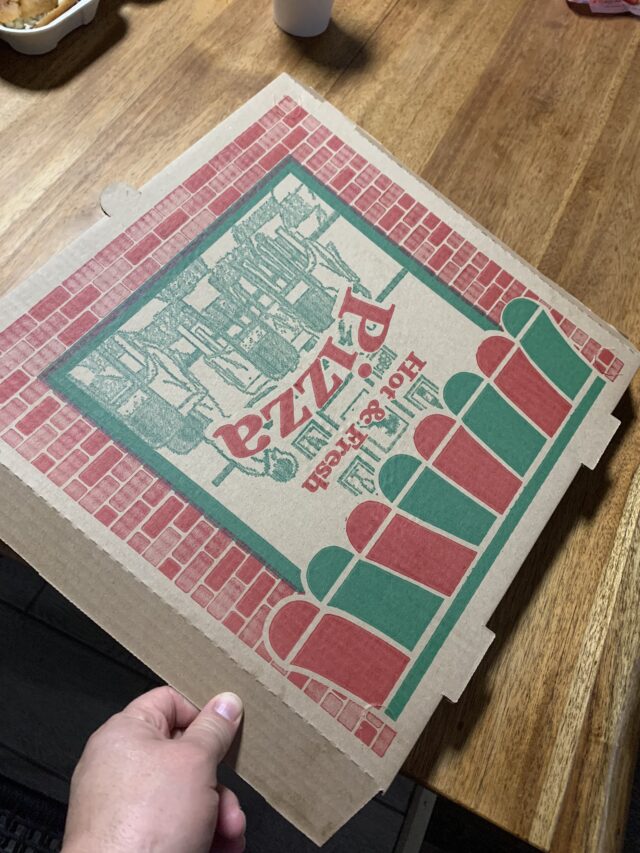Ahead of National Pizza Day on February 9th, people are being reminded about the knock-on effect of putting greasy pizza boxes out with their recycling.
The advice from Barratt Homes comes on the eve of National Pizza Day this Thursday, with many Brits expected to treat themselves to a mid-week takeaway to mark the day.
Although pizza boxes can be recycled since they are made of cardboard, this is only true for pizza boxes that haven’t been contaminated with excess grease and leftover food residue.
One in four Brits unaware that cardboard can be recycled
Research conducted by Barratt Homes last year revealed that one in four (26%) people are unaware that cardboard can be recycled.
As pizza boxes are usually made of cardboard, this means that they can be put out with the rest of your recycling materials including glass, tins, and plastics.
However, people are advised to be careful when adding pizza boxes to their recycling as boxes with excess grease and leftover food residue still on the cardboard can result in the entire recycling collection being rejected.
The research also revealed that more than half of us (54%) have put something we knew couldn’t be recycled in the recycling bin on at least one occasion.
Excess grease can result in pizza boxes not being suitable for recycling
The answer to “can pizza boxes be recycled?” comes down to what condition the cardboard is in before being added to your recycling.
When pizza boxes contain too much grease on them, this makes it near impossible for the cardboard to be recycled into new products. This is because oil is harder to remove during the recycling process and results in reducing the quality of the recycled material.
In these instances where the quality isn’t high enough to be reused, rather than being recycled, the cardboard will end up being incinerated or disposed of at the nearest landfill site.
How to ensure pizza boxes are suitable for recycling
To help ensure that pizza boxes are in a suitable condition for recycling, Barratt Homes have shared the following tips:
1: Remove all food from the box
Adding pizza boxes to your recycling with leftover food stuck to the box will make the cardboard unsuitable for reuse. Make sure that all leftovers are removed before putting out with the rest of your recycling, regardless of how small it may be.
2: Soak up excess grease from the cardboard
As well as food leftovers, excess grease on the box will also contaminate not just the rest of your recycling but the whole collection. This results in items that were suitable for recycling also going to waste. Use a napkin or kitchen towel to soak up any excess grease. Tiny amounts of oil on the box won’t cause a problem but aim to be as thorough as possible with soaking up excess grease.
3: Use the cardboard insert to protect the box from your pizza
Many takeaway companies will include a cardboard insert in the box that your pizza sits on. This is to help protect the box from the greasy pizza bottom. If you’re eating straight out of the box, aim to keep the pizza on this insert which can be used to capture the grease.
4: Just recycle the lid
Unfortunately, sometimes the box may just be too greasy to be suitable for recycling. Not all is lost in this situation though. Although the bottom of the box may recyclable, that doesn’t mean the top half isn’t! Simply remove the lid that isn’t greased up and add this to your recycling.
5: It could still be used in a compost bin
If the pizza box isn’t suitable for recycling, cardboard is biodegradable which means it can still be decomposed in a compost bin.
Gareth Rondel, head of sustainability delivery at Barratt Homes, also reveals top tips for helping Brits to better navigate their recycling habits at home.
1: Create a simple recycling system
Recycling doesn’t have to be complicated and can be made simpler by implementing an easy-to-follow recycling system.
“Start by locating a suitable place to store your recycling in the home, this could be either in a bag, a box, or a bin. Keep the container next to the general waste bin to remind everyone that items should be recycled, and it’s just as easy to do this as binning them.”
2: Find out which items can be recycled
It’s important to understand exactly which items can be recycled, and this information is easily found on local council websites and often on the recycling bins they provide.
“Identifying which items can be recycled is one of the most important steps in become a more recycling-friendly household. Local council websites publish information regarding the items recycled in that area, together with familiarising yourself with the different colour bins provided for your household, as these are assigned to different recycling groups.”
3: Be aware of your recycling day
Recycling is collected on different days, so it’s important to check with your local council which day the collections take place.
“Your local council website will host a wide range of information on recycling, and in particular which days recycling is collected in your local area. Familiarise yourself with your local collection times, make a note of these and keep it in a place that is visible for the entire household.”
4: Fit recycling into your lifestyle
To encourage better recycling habits, try to create a positive routine that fits within your lifestyle.
“Fitting recycling into your lifestyle is one of the best ways to remain on track with your recycling habits. Whether it’s taking the recycling out to be emptied on the way to the supermarket, or as you’re about to embark on the school run. This means you can fit recycling around your work and personal life, and your children can learn whilst you do so.”
“Sustainability and becoming more eco-friendly has never been more important, with households around the UK striving to contribute towards a greener planet.
By becoming more mindful of what and how we are recycling, a small change in household behaviour can make a huge difference across the nation. Our study highlights the areas of recycling that Brits are unfamiliar with, and, from this, we can work to educate ourselves on how we can improve our recycling habits.”




